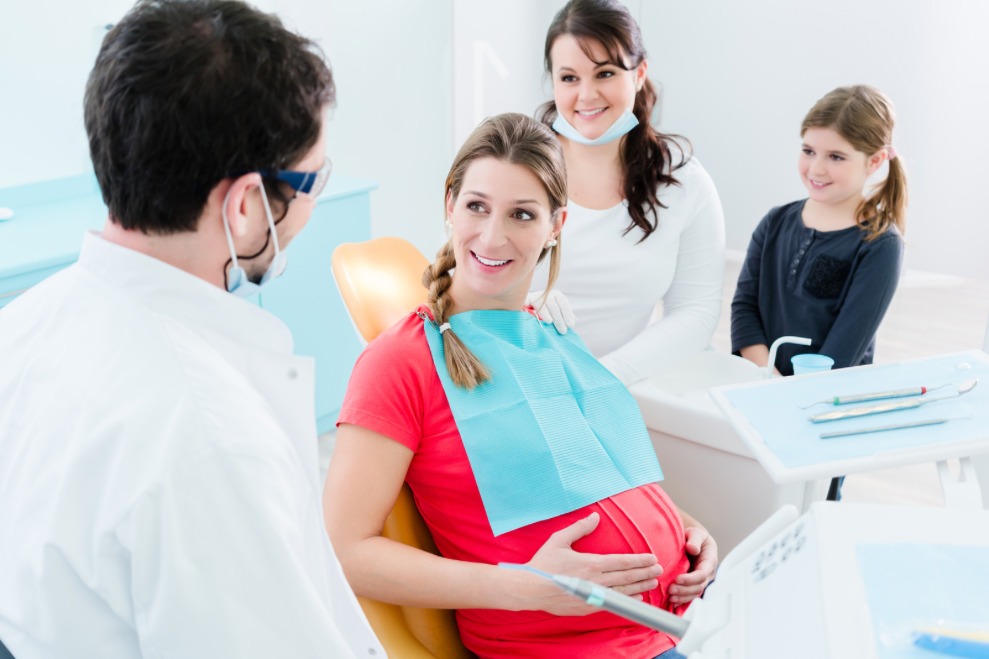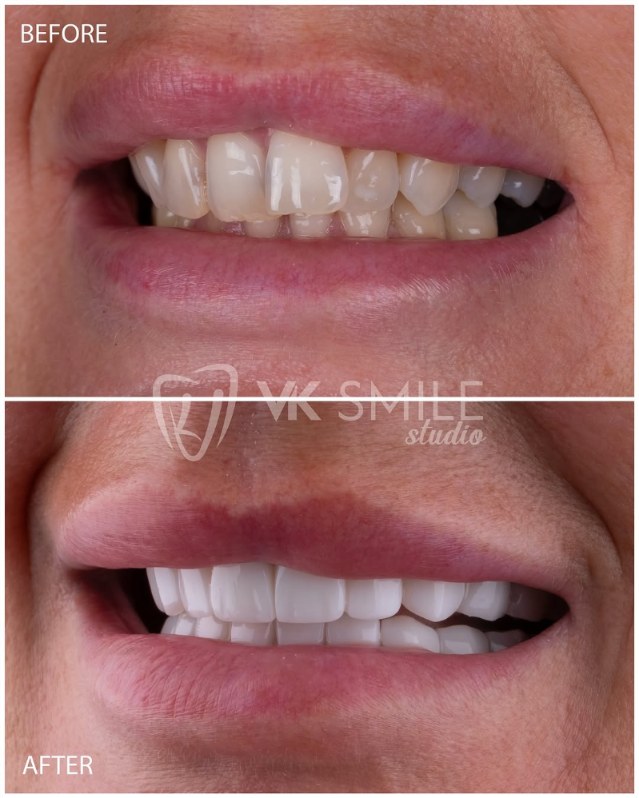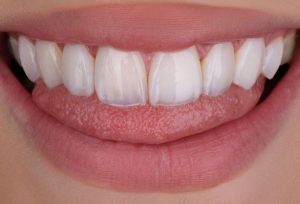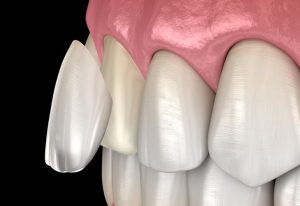Pregnancy can make even routine decisions, including visiting the dentist, feel complicated. For many pregnant women, the fear of potential harm to their baby creates hesitation about scheduling a check-up. Yet untreated tooth pain or gum disease can cause far greater problems. In 2025, with advanced safety protocols and highly regulated clinics across Turkey, modern dental care is safe and essential for expectant mothers.
Trustindex verifies that the original source of the review is Google. They were very helpful and professional. They listened to any concerns about teeth and they installed the dental implants wellPosted onTrustindex verifies that the original source of the review is Google. I found this clinic in Face book, alican and aybuke ,they are the very good dentist DR,and they try to explain everything to me,to have confidant in this dental treatment,thank youPosted onTrustindex verifies that the original source of the review is Google. Really really good I’m happy with my treatmentPosted onTrustindex verifies that the original source of the review is Google. VK SMILE Studio could not fault them. brilliant from start to finish. Highly recommend.my husband had a brilliant experience no pain from start to finish. They proper take care of you. 5***** even the after care is amazingPosted onTrustindex verifies that the original source of the review is Google. The whole experience at VK Smile has been wonderful from arriving from the plane and starting my treatment the very next morning!! Brilliant kind happy staff, it is so clean and very professional.Posted onTrustindex verifies that the original source of the review is Google. The guys at VK took great care of me. From Ali who communicated and reassured me from on WhatsApp in the Uk to Altan the driver to Dr Root Canal (Elif.) Everybody was great. Thanks VK!!Posted onTrustindex verifies that the original source of the review is Google. Perfect from start to finish will communication and staff. Lovely modern clinic with all the best upto date equipment. My experience with VK smile has been nothing but 10 out of 10 Well what a fantastic experience from the very first contact through to the finished article. I 100% would recommend VK smile to anyone that wants a seamless experience and ultimately a fantastic new smile. Every single member of staff has your interests at heart and do everything they can for you and go over and above if needed. Nothing is too much trouble. Visit VK smile and change your life.Posted onTrustindex verifies that the original source of the review is Google. I had a great experience. Everything was easy as they send cars to get you, you have people greeting you and the dentistry is top. The clinic is very clean and so efficient. It's a big thing, but there was minimal pain. I felt I was in expert hands. Highly recommended. I can't wait to get my permanent teeth!!! I've just had my teeth totally finished by Deniz. The end result is so good, so natural that I'm ecstatic! Fantastic all round. I can't say "wow" loudly enough! Thank you to all involved at VK Smile. Amazing!Posted onTrustindex verifies that the original source of the review is Google. Absolutely amazing people here at VK Smile Antalya. The most professional crowd. Happy to be part of the big VK Smile family of happy customers. Thank you VK SmilePosted onTrustindex verifies that the original source of the review is Google. Moja wizyta w klinice przebiegła pomyślnie😉 Jestem zadowolona i polecam z czystym sercem ❤️
Table of Contents
Safe dental treatments in Turkey during pregnancy: What you need to know
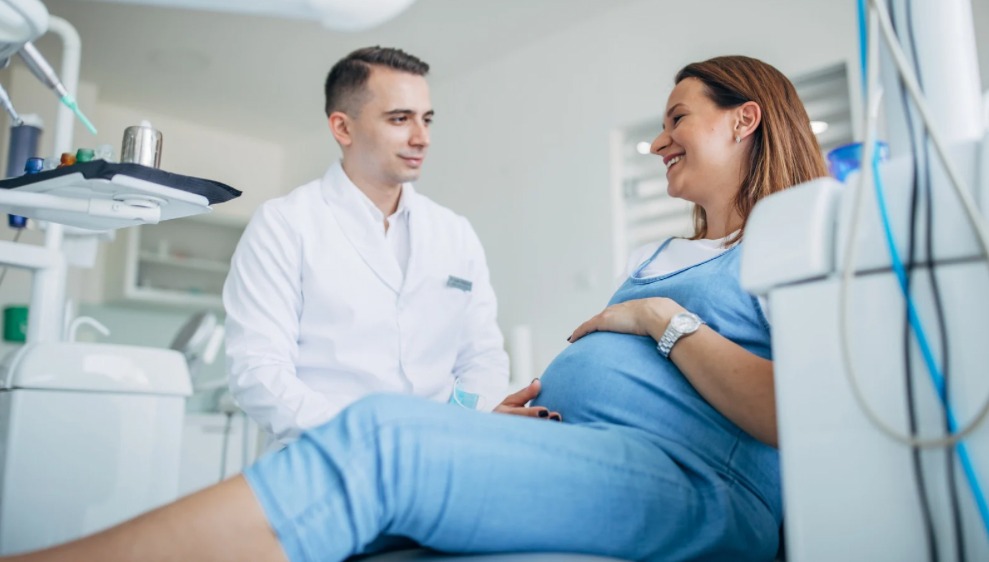
Is it safe to receive dental treatment during pregnancy in Turkey? The answer is yes. Most dental procedures can be performed safely when timed appropriately and conducted with proper care. Pregnancy-related hormonal changes increase the risk of gum disease and tooth decay.
While some treatments should be postponed, many, including cleanings and fillings, are safe.
Renowned for its advanced clinics and regulated care standards, Turkey offers affordable and trusted dental services, providing reassurance to pregnant women seeking expert treatment.
At VK Smile Studio, we offer gentle and pregnancy-safe dental care tailored to your needs.
Why dental care is essential during pregnancy
Understanding the connection between pregnancy and teeth is crucial, as hormonal changes can lead to numerous dental issues. If left untreated, they can progress to periodontal disease, a serious gum infection linked to preterm birth and low birth weight.
Ignoring oral infections during pregnancy can also allow bacteria from the mouth to enter the bloodstream, posing health risks for mother and baby. Maintaining regular dental visits and professional cleaning reduces these dangers.
The World Health Organisation (WHO) and the American Dental Association (ADA) emphasise the importance of maternal oral care as part of prenatal health. Preventive visits help keep teeth and gums healthy while allowing your dentist in Turkey to detect issues early, before they become painful or complicated. Taking advantage of pregnancy exemption programs can make routine check-ups and professional cleanings more accessible for pregnant women.
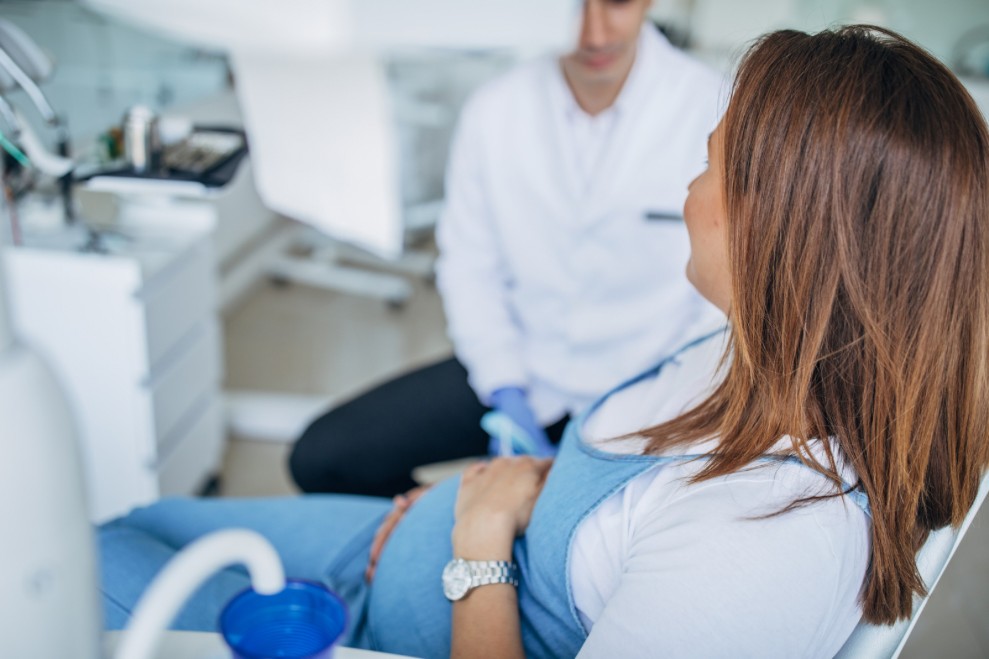
When is the safest time for dental treatments in Turkey during pregnancy?
Understanding the best periods for dentistry while pregnant requires awareness of how the risks and comfort of mother and baby vary across the trimesters. Proper timing ensures the most effective and safest care.
First trimester
The first 12 weeks of pregnancy involve critical organ development, making this the most sensitive period for the baby. Pregnant women often experience fatigue and morning sickness, which can increase discomfort during treatments. Elective dental procedures should be deferred in this phase.
Emergency treatments to relieve dental discomfort or infections remain important and can be performed safely with careful dental supervision. Emphasis during this trimester is on maintaining rigorous oral hygiene and attending routine check-ups without invasive procedures. Special care in medication choice and avoiding x rays unless urgent is also necessary.
Second trimester
For most dental treatments, the second trimester (weeks 13-27) is viewed as the safest and easiest period for expectant mothers. Hormonal fluctuations stabilise, and sickness in the morning tends to subside. Turkey ‘s dental clinics are experienced in providing safe fillings, scaling, and root canal treatments during this window. Local anaesthesia use is considered safe, and treatment positions can be managed effectively to maintain patient comfort. It is the ideal time for preventive care and necessary interventions.
Third trimester
During this trimester, the growing fetus can make lying flat uncomfortable or risky due to pressure on major blood vessels, potentially leading to dizziness or reduced circulation. Therefore, lengthy or non-urgent dental procedures are best postponed until after delivery.
Short, essential treatments to address dental discomfort and urgent infections are still safely undertaken. Experienced dentists in Turkey adapt chair positioning (often using a left lateral tilt) to minimise discomfort and maintain blood flow. Continuous emphasis on oral hygiene care remains crucial to prevent worsening of gum disease or other complications.
Safe dental treatments in Turkey during pregnancy
Thanks to advanced dental technology and pregnancy exemption schemes in Turkey, most dental procedures can be performed throughout pregnancy. In addition to fillings, dental crowns can be placed during the second trimester when necessary. The key is ensuring your dentist knows you are expecting so he can adjust procedures.
Routine cleaning and check-ups
Routine dental cleanings are safe and encouraged during pregnancy in Turkey. Hormonal changes can accelerate plaque buildup, increasing the risk of periodontal disease. Professional cleaning reduces bacteria and inflammation, which benefits oral and overall health during pregnancy.
Fillings and restorations
Cavity fillings and restorations are usually safe in the second trimester, when discomfort is lower and anaesthesia can be managed more effectively. Dentists at VK Smile Studio use mercury-free composite materials, eliminating exposure to potentially harmful substances. Early restoration prevents infection and further complications associated with untreated decay.
Root canal treatment
If infection reaches the tooth pulp, root canal treatment may be necessary. While it may sound complex, it is safe when conducted with appropriate local anaesthesia and limited X ray exposure in Turkey, using protective shielding. This treatment relieves tooth pain and prevents the spread of infection, which can be particularly risky for mother and baby if left untreated.
Tooth extraction
Although it is preferable to delay extractions until after delivery, severe infection or trauma may require urgent removal. Local anaesthetics in Turkey (e.g., lidocaine) are safe for a pregnant woman when dosages are controlled. At VK Smile Studio, multidisciplinary review involving dentists and gynaecologists ensures every extraction is planned for maximum safety.
Procedures to postpone or avoid during pregnancy
Some dental procedures in Turkey are cosmetic or elective and they can wait until after childbirth. The focus during pregnancy should be maintaining health and preventing infection rather than enhancing appearance.
Elective treatments such as teeth whitening, veneers, and certain surgical procedures are best postponed. Similarly, long orthodontic adjustments may cause discomfort during later stages of pregnancy due to posture restrictions.
Dental X-rays
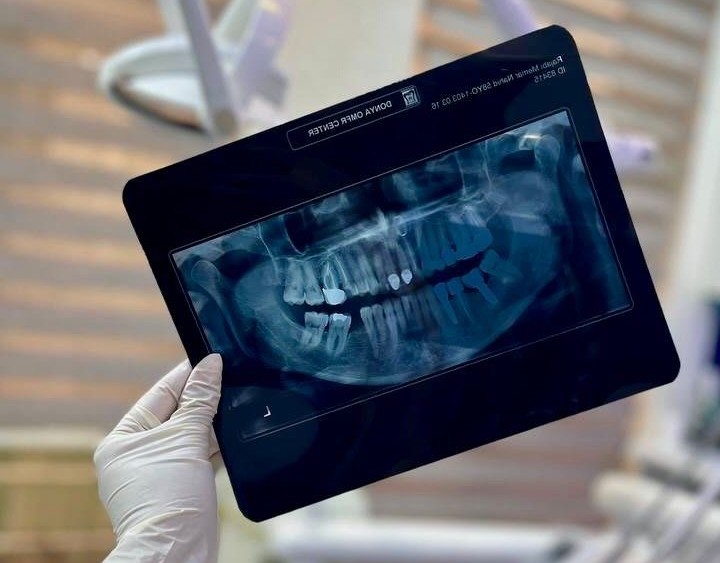
Although modern digital x rays used in Turkey are low-risk, pregnant women often worry about dental x ray during pregnancy side effects. When necessary for urgent diagnosis, protective measures such as lead aprons and thyroid collars eliminate virtually all risk.
Studies show that the exposure from a dental x ray during pregnancy is minimal and poses no known threat to the baby. Unless it is an emergency (e.g., diagnosing severe dental discomfort or infection), it is best to postpone x rays until after birth.
If you are concerned about dental x ray during pregnancy side effects, remember that modern clinics like VK Smile Studio in Turkey follow global safety standards set by the FDA and ADA, ensuring exposure is kept to an absolute minimum.
Here is an overview of when common treatments can be performed during pregnancy in Turkey.
Treatment
Safe
Not safe
Why
Teeth cleaning
All trimesters
Never unsafe
Reduces plaque and gum infection risk.
Dental fillings
2nd trimester
1st trimester (if elective)
Anaesthesia safer in 2nd trimester.
x rays
Emergency only (all trimesters)
Elective cases
Use protective lead apron to block radiation.
Tooth extraction
2nd trimester
Late 3rd trimester
Short procedures preferred; monitor comfort.
Teeth whitening
After birth
All trimesters
Cosmetic; chemicals best avoided during pregnancy.

Your comfort and your baby’s safety come first. Explore treatments recommended for moms-to-be and discover transparent pricing.
Anaesthesia, pain relief, and antibiotics during pregnancy
Pain management and infection control are important considerations for pregnant women undergoing dental treatment. With careful planning, most medications used in dentistry are safe:
- Local anaesthesia. Lidocaine is the most commonly used agent and is considered safe when dosed appropriately for pregnancy. At our clinic in Turkey, your dentist will monitor your comfort and ensure dosage and administration minimise any risks, coordinating with your healthcare providers when needed.
- Pain relief. Over-the-counter paracetamol is the preferred option for managing dental pain during pregnancy. Nonsteroidal anti-inflammatory drugs (NSAIDs), such as ibuprofen, should be avoided in Turkey, particularly in the third trimester, as they can negatively impact fetal circulation, including premature closure of the ductus arteriosus.
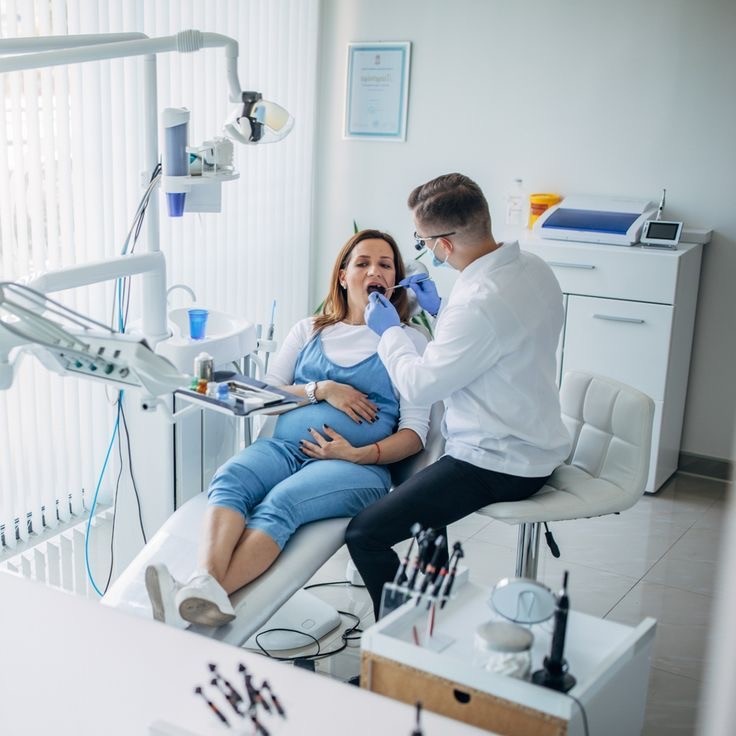
- Antibiotics. During pregnancy, antibiotics such as penicillin, amoxicillin, and clindamycin can be safely used when treating an infection. Tetracyclines are contraindicated because of their potential to affect fetal tooth development and bone growth. Prescriptions are carefully considered and tailored to individual patient needs.
- Communication is key. Always tell your dentist in Turkey you are pregnant, as this allows careful planning of treatments and minimises concerns about dental x ray during pregnancy side effects.
Can local anaesthesia be harmful to the fetus?
When administered under professional supervision, local anaesthesia does not harm the fetus and is a safe option for managing tooth pain during pregnancy. The primary concern is the potential, albeit very rare, risk of fetal hypoxia or systemic toxicity if the anaesthetic crosses the placental barrier in significant amounts.
Modern local anaesthetics like lidocaine have been studied and are widely used in Turkey in 2025 for dentistry while pregnant, under strict protocols to ensure maternal and fetal safety. Our clinic’s dentist experts follow guidelines that minimise these risks, such as using the lowest effective dose, aspirating before injection to prevent intravascular administration, and monitoring maternal vital signs diligently.
What can I take for pain control after a dental procedure in Turkey?
Managing pain after dental procedures during pregnancy requires special care to ensure maternal comfort and fetal safety. Pregnant women can safely use acetaminophen (paracetamol) at the recommended doses; it is the medication most often recommended.
Avoid taking nonsteroidal anti-inflammatory drugs (NSAIDs), such as ibuprofen, especially in the third trimester, due to potential risks for the fetus. Always consult your dentist in Turkey or healthcare provider before taking any medication.
They will guide you on the safest options tailored to your situation to manage pain without compromising pregnancy health. Non-medical methods like applying a cold compress and resting can also help alleviate discomfort after dental treatments during pregnancy.
What happens if you delay dental treatment during pregnancy?
Delaying care available under dental treatment when pregnant NHS guidelines may result in complications later, such as multiple dental crowns.
Key risks of delaying treatment include:
- Worsening gum disease and periodontal issues. Pregnancy-related hormonal changes increase gum sensitivity, and skipping cleanings can worsen inflammation.
- Tooth decay rapid progression. Untreated cavities may cause pain and necessitate more invasive procedures later.
- Tooth abscess or infection. These can spread systemically, posing serious health threats to mother and fetus.
- Adverse pregnancy outcomes. Chronic oral inflammation has been associated with increased risks of preterm birth and low birth weight.
- Exacerbation of discomfort from oral dryness or morning sickness, which can further deteriorate oral health.
Maintaining early and routine dental intervention involves the following:
- Regular professional dental check-ups enable early detection and management of oral health problems, preventing minor issues from escalating
- Diligent oral hygiene practices at home support professional care, reducing infection and inflammation risks
- Timely treatment protects fetal development by minimising inflammatory responses and infection hazards
Pregnant women should collaborate with their dentists and healthcare providers to ensure a safe treatment plan tailored to their pregnancy stage and individual needs.
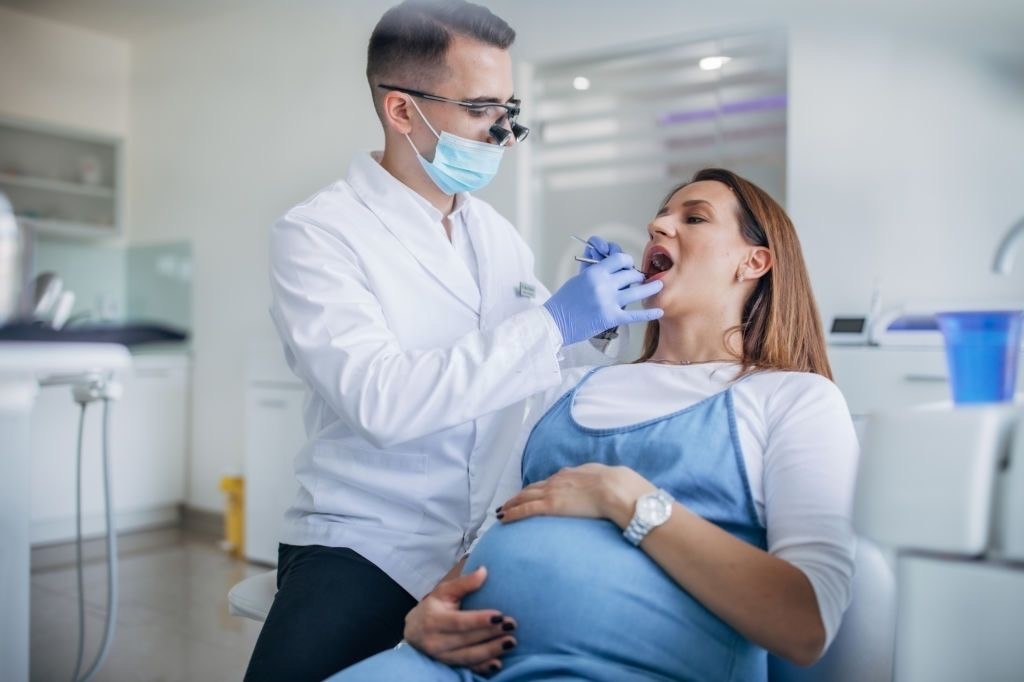
Oral care tips for expecting mothers
In some countries, a maternity exemption certificate allows a pregnant woman to receive free or subsidised dental treatments because maintaining excellent oral health at home is essential when considering pregnancy and teeth questions. With hormonal changes, shifts in diets, and morning sickness, women often look for gentle yet effective hygiene routines:
- If you want your teeth to be healthy, brush then twice a day with fluoride toothpaste and use a soft-bristled toothbrush. Soft bristles protect sensitive gums often prone to pregnancy gingivitis
- Floss daily or use interdental brushes to remove plaque from between teeth and below the gum line, preventing inflammation and cavities
- After episodes of morning sickness, rinse your mouth with a mild baking soda solution (a teaspoon of baking soda dissolved in a cup of water) to neutralise stomach acids. Wait about 30 minutes before brushing to protect enamel
- Stay well hydrated throughout the day to combat dry mouth, which can increase decay risk
- Maintain a balanced diet rich in calcium and vitamin D to support strong teeth and healthy gums for you and your baby. Limit sugary and acidic foods and drinks which promote tooth deterioration
- You should change your toothbrush every three months
- Avoid toothpaste containing sodium lauryl sulfate (SLS) if you experience mouth irritation
- Consider safe home remedies such as warm saltwater rinses to soothe irritated gums
- Regular dental check-ups are vital. Inform your dentist about your pregnancy so treatments can be adjusted safely
- If you notice bleeding, swelling, pain, or any unusual oral changes, contact your dentist promptly to prevent complications
By following these oral care practices, pregnant women can reduce the risk of periodontal disease, tooth deterioration, and discomfort from oral dryness, contributing to their overall health.
Why choose VK Smile Studio in Turkey for pregnancy-safe dental care
Similar to pregnant free dental care schemes available elsewhere, our dental studio is a leading dental clinic in Turkey specialising in safe and effective dental treatments for pregnant women. Our commitment to maternal oral health is reflected in every aspect of our care.
- Compliance with regulations. Our clinic strictly adheres to the Turkish Ministry of Health’s Health Tourism Regulation and NHS dental health regulations, ensuring all treatments meet rigorous international standards for safety and quality.
- Advanced technologies and safety protocols in Turkey. We employ cutting-edge digital diagnostics and maintain impeccable sterilisation protocols to minimise infection risk, providing a clean and safe treatment environment for expectant mothers.
- Pregnancy-specific expertise. Our team includes experienced dentists specially trained to accommodate the unique needs of pregnant patients. We understand hormonal changes, sensitivity, and comfort challenges during pregnancy and adapt treatments.
- Use of approved materials and gentle anaesthesia. We only use CE- and FDA-approved biocompatible materials combined with gentle anaesthetic techniques that prioritise the safety of mother and baby.
- Personalised patient support. From the initial consultation through treatment planning to post-care monitoring, we provide comprehensive support tailored to each patient. Our multilingual coordinators help international patients feel at ease and fully informed at every step.
- Collaboration with healthcare providers in Turkey. We coordinate closely with your obstetrician and healthcare team to guarantee that all dental care aligns with your pregnancy health plan, assuring you receive safe and stress-free treatment.
FAQ
Can I have dental treatment in Turkey while pregnant?
Yes, many dental treatments are safe during pregnancy. Many countries offer pregnancy exemption, covering routine cleanings, fillings, and emergency dental care, and NHS dental coverage, making it easier for expecting mothers to prioritise oral health.
What dental procedures are not safe during pregnancy?
Cosmetic treatments such as teeth whitening and elective surgeries should be postponed until after delivery, as they are not medically necessary and may pose risks during pregnancy.
When should I avoid dental treatment during pregnancy?
Non-essential dental procedures should be avoided particularly in the first trimester, when the fetus is most vulnerable. Focus on emergency care (e.g., severe tooth pain or infections) to ensure safety.
Which trimester is safest for dental procedures in Turkey?
The second trimester, from weeks 13 to 27, is considered the safest time for dental treatments, balancing patient comfort and minimal risk to the developing baby.
Do I have to tell my dentist I'm pregnant?
Absolutely. When scheduling a visit, let your dentist know if you are pregnant. It enables careful selection of anaesthetics, medications, and diagnostic tools like x rays to ensure safe dental care tailored to pregnancy.
Prioritise your oral health for a healthy pregnancy
Maintaining good oral hygiene while pregnant is important for your health and your baby’s growth. With expert, pregnancy-sensitive dental care and personalised treatment plans, VK Smile Studio in Turkey ensures every procedure is safe, comfortable, and timely. Schedule a consultation today to maintain your healthy smile and support a healthy pregnancy.



